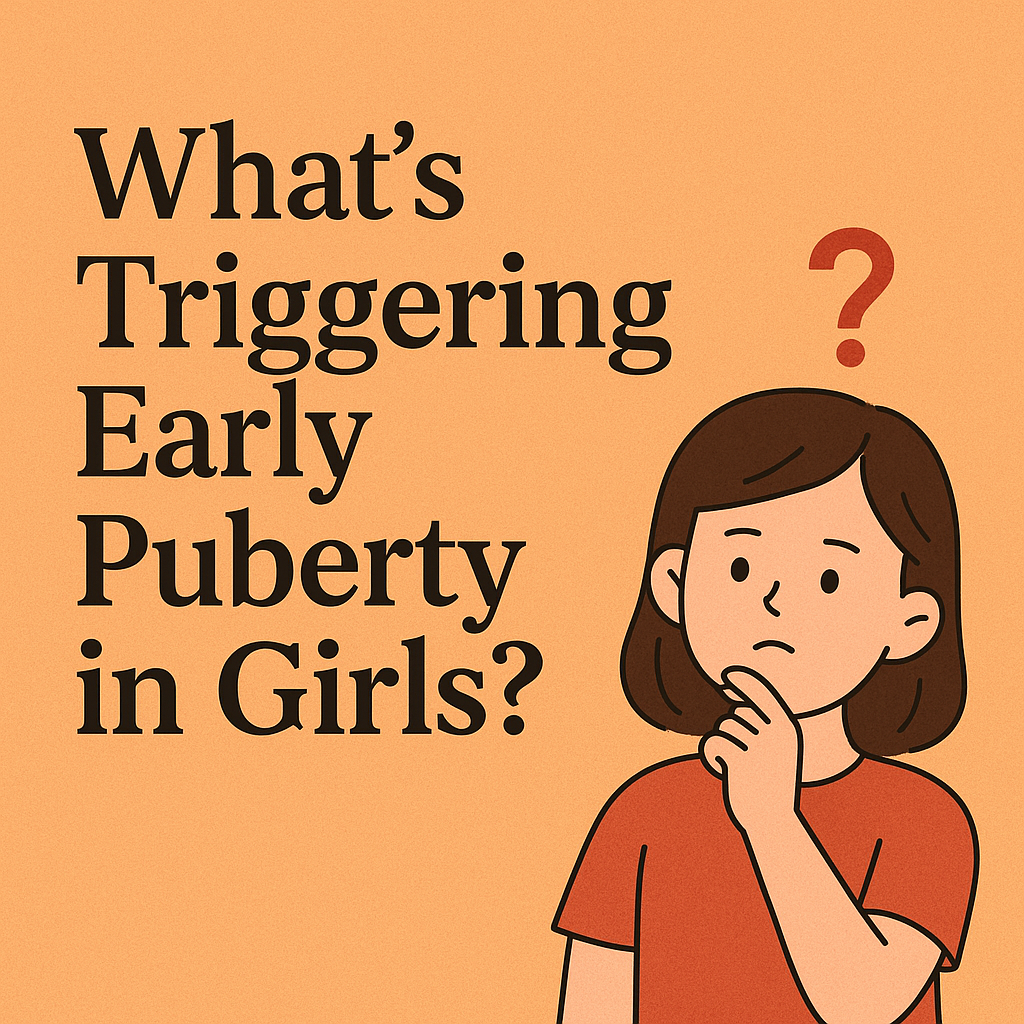🧠 Introduction: When Childhood Feels Too Short
Is your daughter showing signs of early puberty — maybe before age 8? You’re not alone.
Worldwide, more and more girls are entering puberty earlier than expected. Breasts developing in first grade, mood swings by age seven, or even early periods (menarche) — this trend, once rare, is becoming common. While this may seem like nature’s clock speeding up, experts warn: that early puberty can pose physical, emotional, and long-term health risks.
This blog explores why early puberty is on the rise — from both a scientific and Ayurvedic lens — and what parents can do to protect their children’s natural growth timeline.
⚠️ Why Is Puberty Arriving Earlier?
Let’s dive into the top causes identified by modern science and Ayurveda.
🔬 From the Scientific World
-
Genetics:
If mom or sister had early puberty, there’s a good chance the daughter might too. Genes like MKRN3 are linked to early reproductive development. -
Obesity & Metabolic Signals:
Fat tissue makes hormones like leptin, which can falsely signal the brain that the body is ready for puberty.
➡️ Higher BMI = Higher Risk. -
Endocrine Disrupting Chemicals (EDCs):
Plastics, cosmetics, and packaged foods can contain BPA and phthalates — chemicals that mimic estrogen.
- EDCs are widely found in personal care items, plastic containers, toys for babies, beverage cans, cosmetics, shampoo, shower gel, and several food ingredients.
- A potential connection between exposure to EDCs and the increasing prevalence of various endocrine, metabolic, and reproductive-related diseases and disorders among children.
- BPA impact puberty by disrupting metabolism and endocrine balance.
-
Hormones in Food:
Animal milk and meat from hormone-treated sources may increase estrogen exposure (though evidence is evolving).
-
Neurological Issues:
Rarely, brain tumors or cysts can signal the body to start puberty prematurely. -
Stress & Lifestyle:
Childhood stress, trauma, irregular sleep, and even excess screen time can disturb melatonin and cortisol — hormones that help regulate puberty onset.
🌿 Ayurvedic Perspective: A Doshic Imbalance
Ayurveda views precocious puberty as an imbalance of:
-
Pitta Dosha (heat, hormones) — When elevated, it can speed up maturation.
-
Kapha Dosha (growth, nourishment) — Excess Kapha can cause premature bodily growth.
-
Ama (toxins) — Accumulated from improper diet and lifestyle, disturbing the body’s internal clock.
➡️ Triggers:
-
Heavy, spicy, oily or processed foods
-
Inactivity and poor sleep
-
Emotional stress or overstimulation
-
Exposure to adult content too early
Ayurveda stresses that when Pitta and Kapha go out of sync during childhood, the reproductive system can awaken before its time.
✅ How to Prevent or Delay Early Puberty
Modern Recommendations:
-
👟 Keep kids physically active (at least 60 mins/day).
-
🥗 Offer a whole-food, fiber-rich diet.
-
🧼 Use BPA-free plastics; avoid heating food in plastic.
-
💤 Ensure 9–10 hours of sleep.
-
💆♀️ Reduce emotional stress and screen exposure.
Ayurvedic Tools:
-
🍃 Pitta-Kapha pacifying diet: More greens, fruits, rice, ghee; avoid pickles, fried and spicy foods.
-
🪷 Shatavari, turmeric, and amalaki: Help cool and balance hormones naturally.
-
🧘♀️ Yoga & pranayama for kids: Reduce Vata and Pitta, calm the mind.
-
🫖 Herbal tonics and detox (like virechana) under practitioner guidance if doshic imbalance is severe.
💬 Real Talk: What You Can Do Today
-
Observe early signs (breast development, pubic hair, mood swings).
-
Clean up the diet: Limit junk food and processed dairy.
-
Swap plastic for glass or stainless steel at home.
-
Talk to your child: A loving, grounded relationship helps lower stress hormones.
-
Get a pediatric check-up: Rule out medical causes or monitor if needed.
✨ Conclusion: Let Nature Set the Pace
Childhood should be a time of curiosity, creativity, and calm—not early hormones, bras, and cycles. Whether viewed through the microscope or through the lens of Ayurveda, early puberty is a call to rebalance.
Protecting your daughter’s natural rhythm is possible — with awareness, nutrition, and love.
📚 References
- Shim YS, Lee HS, Hwang JS. Genetic factors in precocious puberty. Clin Exp Pediatr. 2022 Apr;65(4):172-181.
- Huang A, Reinehr T, Roth CL. Connections Between Obesity and Puberty: Invited by Manuel Tena-Sempere, Cordoba. Curr Opin Endocr Metab Res. 2020 Oct;14:160-168.
- Calcaterra V, Cena H, Loperfido F, Rossi V, Grazi R, Quatrale A, De Giuseppe R, Manuelli M, Zuccotti G. Evaluating Phthalates and Bisphenol in Foods: Risks for Precocious Puberty and Early-Onset Obesity. Nutrients. 2024 Aug 16;16(16):2732.
- Malekinejad H, Rezabakhsh A. Hormones in Dairy Foods and Their Impact on Public Health – A Narrative Review Article. Iran J Public Health. 2015 Jun;44(6):742-58.
- Chen C, Chen Y, Zhang Y, Sun W, Jiang Y, Song Y, Zhu Q, Mei H, Wang X, Liu S, Jiang F. Association between Dietary Patterns and Precocious Puberty in Children: A Population-Based Study. Int J Endocrinol. 2018 Jan 16;2018:4528704.
- Street ME, Ponzi D, Renati R, Petraroli M, D’Alvano T, Lattanzi C, Ferrari V, Rollo D, Stagi S. Precocious puberty under stressful conditions: new understanding and insights from the lessons learnt from international adoptions and the COVID-19 pandemic. Front Endocrinol (Lausanne). 2023 May 2;14:1149417.
- Colich NL, Hanford LC, Weissman DG, Allen NB, Shirtcliff EA, Lengua LJ, Sheridan MA, McLaughlin KA. Childhood trauma, earlier pubertal timing, and psychopathology in adolescence: The role of corticolimbic development. Dev Cogn Neurosci. 2023 Feb;59:101187.
- Tang J, Yu T, Jiang Y, Xue P, Kong H, Lin C, Liu S, Tian Y. The association between sleep and early pubertal development in Chinese children: a school population-based cross-sectional study. Front Endocrinol (Lausanne). 2023 Nov 23;14:1259172.

Akanksha Sharma
Dr. Akanksha Sharma, Head Writer and creator of AtoZ of Pregnancy, is dedicated to empowering women, parents, and families through 360-degree knowledge. She and her team provide evidence-based advice to guide families through pregnancy, parenting and beyond.






